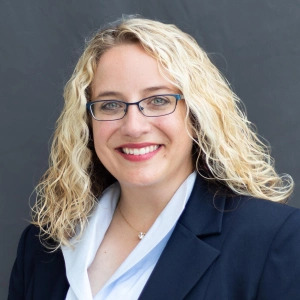Interview With Dr. Julie Cox of Western Illinois University

Julie Cox, Ph.D., CCC-SLP joined the WIU Speech Pathology & Audiology faculty in 2012. Dr. Cox earned her B.S. and M.S. in Communication Sciences and Disorders from Illinois State University in 2005 and 2007, respectively. She completed her Ph.D. in Interdisciplinary Health Sciences at Western Michigan University in 2018. She currently serves as the Graduate Coordinator in addition to her responsibilities of teaching courses and supervising in the Speech-Language Clinic.
Dr. Cox teaches a variety of topics for undergraduate and graduate students within the department. She also supervises students in the on-campus clinic in the areas of acquired neurogenic communication disorders. In 2019, the Western Illinois University (WIU) Speech-Language Clinic was awarded a grant through the Parkinson Voice Project. Dr. Cox was trained at their clinic in Dallas, Texas and serves as the primary SLP for that program. Her research interests are in the areas of assessment and intervention for mild cognitive impairment (MCI) and dementia, and as related to her teaching, she enjoys conducting pedagogical research.
Prior to coming to WIU, Dr. Cox practiced as a speech-language pathologist in long-term care, outpatient clinics, and private practice. She most recently served as the Director of Rehabilitation for a long-term care facility overseeing an interdisciplinary therapy team. Dr. Cox is a certified provider of VitalStim therapy for dysphagia. She has provided training for skilled-care facilities on oral care, general aspiration risks, and aspiration risks for those with tracheostomies.
She holds the Certificate of Clinical Competence in Speech-Language Pathology from the American Speech-Language Hearing Association (ASHA) and a professional license in the state of Illinois.
Note: You should consult with your doctor or speech pathologist for recommendations on treatment. The views and opinions expressed in this article are those of Dr. Cox and do not necessarily reflect the official policy or position of SpeechPathologyMastersPrograms.com
How did you become interested in researching mild cognitive impairment (MCI)?
My clinical background before changing careers to more of an academic focus was primarily in skilled nursing facilities (SNFs). Because of the setting, which also included quite a few short-term rehab beds, I saw the range of cognitive function from within normal limits to severe impairments associated with Alzheimer’s and other forms of dementia. My greatest interest was with those residents who were planning to just be there for short-term stays, but had already been experiencing some minor changes in cognition, or those who had not previously noticed change but were altered from anesthesia, medical complexities, etc. Those patients were the ones who I felt I could improve the most by teaching them strategies and providing a level of challenge to push them outside just the routine of daily life.
How has our understanding of MCI improved in recent years?
At that time that I was working primarily clinically, I do not know that we really knew much at all about MCI. I rarely saw that as a formal diagnosis, yet I am confident that is what many of my patients had especially since we now know that it can be a transient condition. I think establishing the existence of the disorder, as well as the varying presentations have allowed us to be more purposeful in our communication with physicians, as well as in our overall treatment planning.
What are some of the current challenges of assessing and treating MCI?
The assessment methods we have pose the greatest challenge in my mind. Many of the standard SLP assessments have the language focus (as they should), but do not go deeply enough into cognition. The test that I like the best is the CLQT (Cognitive Linguistic Quick Test), however I do not feel that it is sensitive enough to detect mild impairments, which was supported in my dissertation research. That particular test parses out the domains of cognition as readily as any, with the understanding that many of the tasks we perform, whether structured or unstructured, require intact function of multiple domains.
How has your work as director of rehabilitation in a long-term care facility influenced both your teaching and research?
I think I have hit on my research interests stemming from my work as a SNF Speech-Language Pathologist (SLP) and director of rehabilitation. As far as how my previous career has shaped my teaching, it has allowed me to provide insight on not only the clinical aspects of MCI and many other communication/swallowing disorders (a trait that I feel is often lost if professors go straight from an MS/MA to a PhD program), but it has also allowed me to speak more to the reimbursement challenges surrounding MCI/cognitive decline. There is much to be said about maintenance of skills and, of course, we can all cite court cases where maintenance (not always huge progress) was found to be absolutely appropriate. Navigating the challenges of billing, documentation, and caseload building is difficult, especially for new clinicians. We have to strike the balance of diving in as deeply as we can to figure out the best strategies for implementation with each individual, while working expediently before our services are “cut” by a third-party payor. I believe that is one aspect I am able to emphasize and pass along to my students.
What aspect of your work are you most proud of?
I am most proud of the relationships I have built with my patients (past and present). I am a firm believer that cognitive rehab is useless without some level of personal, yet professional, connection. Without those connections and those relationships, patients and their families often experience a lack of “buy-in” that is critical for outcomes. As an SLP – a communication specialist, it is my job to truly communicate myself to get to the heart of the challenges and find meaningful ways to bridge the gap between current level of function and goal level of function.
Do you have any advice for those entering a speech pathology master’s program?
Based on my above answer, put the devices down and communicate! The tablets, the laptops, the phones – all great instruments, but that is just what they are…instruments. WE, as humans, are communicators, so we must foster improved speech, language, and cognition through effective communication with our patients, their families, and their caregivers/staff in order to determine the needs of the individual for treatment planning. In addition, this allows us to model strong communication and foster that uniquely human quality of verbal communication.
Sponsored online speech pathology programs

Online MS: Pursue SLP Certification. Study FT/PT
Speech@Emerson enables you to earn an MS online and pursue SLP certification in as few as 20 mos. Learn the same curriculum as the on-campus program. Study FT or PT.
- Prepares you to pursue certification as an SLP generalist
- In-person clinical placements at faculty-approved partner sites
- As few as 20 months to complete
SPONSORED

Want to Become an SLP? Earn an MS Online at NYU
NYU Steinhardt’s online master of science program in Communicative Sciences and Disorders prepares aspiring speech-language pathologists with a comprehensive professional education.
- Prepares students to pursue SLP licensure
- Accredited by ASHA’s Council on Academic Accreditation
- As few as six terms to complete
- Full-time and part-time plans of study
SPONSORED

Online MS in Speech-Language Pathology from Pepperdine University
Pepperdine University’s online Master of Science in Speech-Language Pathology program combines a robust, innovative curriculum rooted in Christian values with a full-time or part-time option that features online learning, on-campus intensive experiences, and comprehensive clinical field practicums to prepare skilled, compassionate students for careers as speech-language pathologists.
- Full-time (five trimesters) or part-time (eight trimesters) options available.
- No GRE scores required.
- 400+ supervised, clinical learning hours are done at schools/clinics local to students
- Three onsite experiences build a sense of camaraderie and community throughout the program
SPONSORED

